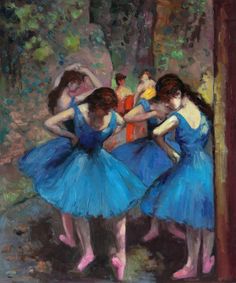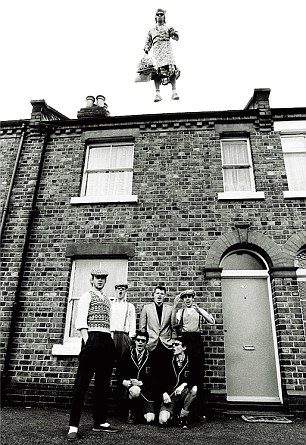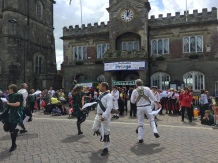161 - Learning English with The Beatles
Thursday, July 14, 2016
Language is cultural as much as grammatical. The Spanish don’t say “my” as much as we do. I don’t know if that’s a cultural thing, something to do with not wanting to boast, not wanting to appear too proud, or what. It felt odd at first, but you become accustomed to it. “The head hurts me” to the doctor. “The tooth hurts me” to the dentist. No need to say “my tooth” – after all, nobody else’s tooth is likely to hurt me. “I’m going back to  the flat”. “I think we will go in the car”. Not “MY flat” or “MY car”. I may be wrong, but this reticence seems to me to be connected to the avoidance of the use of“yo” or “tú” etc except when really necessary for clarity or emphasis. Something about not wanting to draw attention to themselves, maybe. Not wanting to stand out. the flat”. “I think we will go in the car”. Not “MY flat” or “MY car”. I may be wrong, but this reticence seems to me to be connected to the avoidance of the use of“yo” or “tú” etc except when really necessary for clarity or emphasis. Something about not wanting to draw attention to themselves, maybe. Not wanting to stand out.
That’s another obstacle, then, to overcome at my Tuesday English “class” at the day centre. I say “class”, but I’m not a teacher. It’s a rather random group, all levels, never the same people. Quite impossible, really! My most regular, most committed is T. Her stroke muffles her speech somewhat, but she has a reasonable level of English from when she worked for a year living in an English family’s house, and she turns up every week without fail (mind you, they get chucked out of the homelessness hostel during the day, and our day centre nearby is warm in winter and cool in summer, so I don’t imagine they come just for the excitement of a bit of English conversation!). But she is very traditional. It’s hard to get her to use personal pronouns or possessive pronouns – she is more comfortable just saying “like it” rather than “I like it”. And “the handbag” rather than “my handbag”.
 So I’d prepared an exercise to practise all this. Photos of basic shopping items, with the English name underneath. Useful for the absolute beginners who often turn up, but nice and flexible to make into a more advanced exercise for T. Her task was to make a whole sentence with the item. A carton of juice – “i put the carton of juice in the refrigerator”. A blue scarf – “I want a blue scarf and I will wear it in the winter”. So I’d prepared an exercise to practise all this. Photos of basic shopping items, with the English name underneath. Useful for the absolute beginners who often turn up, but nice and flexible to make into a more advanced exercise for T. Her task was to make a whole sentence with the item. A carton of juice – “i put the carton of juice in the refrigerator”. A blue scarf – “I want a blue scarf and I will wear it in the winter”.
The food items went fine. She put most of them in the fridge, and a few on a shelf. One item, a jar of chick-peas, she refused to talk about, saying that beans in jars were “una barbaridad”. I insisted she made a sentence in English, and she said “Chick-peas in a jar do not exist!” Grammatically correct, albeit a little surreal.
The clothing and furniture items changed the mood. I had prompted her several times to use “my”. Suddenly, talking about a painting, she said “I would like to put this painting in MY bedroom in MY house”. She shouted the word “MY”. Then without waiting for me she rushed onto the next photos, jabbing her finger at each one, “This cupboard in MY bedroom, this jacket in MY cupboard, this table in MY house, this sofa on MY terrace.” Her tears were flowing but she didn’t stop. “Blue towels in MY bathroom, big cushions in MY lounge, red curtains in MY house MY house MY house.” And she ran out of steam. Despite the tears, she had an enormous smile. Then she flipped back into Spanish and it all came out between her sobs.
After eighteen months in the homeless hostel there was now a slim chance, just an outside chance, that she and her newish boyfriend were quite high on the list for a flat. His amputated leg and her speech and walking problems seem to give enough “points” and the housing department is considering them for a flat once her boyfriend’s disability money gets sorted so he can pay the rent. “MY flat MY flat MY flat” she smiled, borrowing a tissue to blow her nose. amputated leg and her speech and walking problems seem to give enough “points” and the housing department is considering them for a flat once her boyfriend’s disability money gets sorted so he can pay the rent. “MY flat MY flat MY flat” she smiled, borrowing a tissue to blow her nose.
We were joined by a new student just in time for the last exercise of the morning. They were to choose a painting from the art book, and describe first what they could see, and then whether they liked it or not and why. He chose a 17th century nude, said he could see her breasts, and that he liked it because he could see her breasts. His  grammar was more or less OK. Then T’s turn. She leafed through the well-worn book and chose a Degas painting. She accurately said there were five dancers, young women, wearing blue tulle and ballet shoes. She brilliantly added “They SEEM to be outside, POSSIBLY they are in a garden or in a forest. The grass is green.” “Why do you like it?” I asked. “Because I was a ballerina” she answered. grammar was more or less OK. Then T’s turn. She leafed through the well-worn book and chose a Degas painting. She accurately said there were five dancers, young women, wearing blue tulle and ballet shoes. She brilliantly added “They SEEM to be outside, POSSIBLY they are in a garden or in a forest. The grass is green.” “Why do you like it?” I asked. “Because I was a ballerina” she answered.
And then, as so often, she burst into a Beatles song – “When I was younger, so much younger than today-ay-ay …” and hooted with laughter. She continued with “Yesterday, all my troubles seemed so far away”. Behind the smile I could see her tears were about to come again. As a young ballerina, how could she have imagined that later she’d be living in a dormitory in a council hostel, half-paralysed by a stroke and far from any family? 
Then her internal song changed again. Madness came, literally. At the top of her voice, waving her arms above her head, the song burst out of her. “MY house, in the middle of the street. MY HOUSE!” The other student looked confused and went back to looking at nudes in the art book. T and I smiled at each other.
© Tamara Essex 2016
http://www.twocampos.com
https://raisfundacion.org/es/
 2
Like
Published at 11:18 AM Comments (3)
2
Like
Published at 11:18 AM Comments (3)
160 - Two Campos Divided
Thursday, July 7, 2016
It was warm on the plane so I peeled off my two thin jumpers, which I’d worn for the whole five days in Dorset, not having packed correctly for the British “summer”. Shoving them into my flight bag in the overhead locker I snagged it slightly on the safety pin. Apparently now in Britain we have to label ourselves to say to strangers “I’m not a complete pillock and it is safe to be near me without fear that I will randomly abuse or assault a complete stranger who isn’t bothering me”. I wore it, the safety pin, throughout my visit, with mixed feelings of solidarity for immigrants in the UK and an overwhelming sadness for the need. now in Britain we have to label ourselves to say to strangers “I’m not a complete pillock and it is safe to be near me without fear that I will randomly abuse or assault a complete stranger who isn’t bothering me”. I wore it, the safety pin, throughout my visit, with mixed feelings of solidarity for immigrants in the UK and an overwhelming sadness for the need.
I didn’t go on the march. And I didn’t sign the petition calling for a second referendum. I’m an unhappy loser, I’m not a sore loser. I spent Referendum Night in a British bar in a British enclave west of Málaga. Not my usual choice of venue (especially on the Pagan Night of San Juan, one of my favourite nights of the year in Spain). But I’d been asked to spend the evening with the ITV news crew reporting from Spain for the overnight results programme. We were upbeat. It had been a typical hot June day, there were fireworks on the beach for San Juan, ITV was paying for all our food and drink, we were representing UK immigrants abroad, and we were convinced all would be well.
Geraint Vincent, the ITV news reporter, popped over to our table to tell me I was on first, along with a nice chap called John, who runs a business helping Brits buy bars, shops, and other businesses along the Costa del Sol. As we were accompanied to the “hotseats” my mouth went dry and the ability to construct a sentence exited stage left. A quick shot of us flashed up on the producer’s screen, and it suddenly occurred to me that everybody in the UK would hate us. They had battled through storms and floods to vote. It was midnight, we were in skimpy t-shirts, sporting golden tans, seated on an open terrace with the sea, the stars, and the fireworks behind us. We represented smug retirement-by-the-sea, regardless of the reality. Mentally I did a quick re-write of my opening phrase. of us flashed up on the producer’s screen, and it suddenly occurred to me that everybody in the UK would hate us. They had battled through storms and floods to vote. It was midnight, we were in skimpy t-shirts, sporting golden tans, seated on an open terrace with the sea, the stars, and the fireworks behind us. We represented smug retirement-by-the-sea, regardless of the reality. Mentally I did a quick re-write of my opening phrase.
“Well Geraint,” I forced out from a dry throat. “The important thing to say is that we British immigrants in Europe haven’t voted selfishly.” Behind me in the bar, a Sarf London voice said “We ain’t immigrants, we’re expats, innit”. I ploughed on. “I voted Remain because of the bigger issues – the role the EU has played in maintaining peace, and our nation’s ability  to trade, plus of course I want the UK’s young people to benefit from the same freedom to study and work abroad, travel freely and choose where to live, that we have all benefited from.” There were nods around the bar. Geraint moved on to John, who spoke articulately about the impact a Leave vote would have not only on his relocation business but on the aspirations of all the families planning their futures in southern Europe. to trade, plus of course I want the UK’s young people to benefit from the same freedom to study and work abroad, travel freely and choose where to live, that we have all benefited from.” There were nods around the bar. Geraint moved on to John, who spoke articulately about the impact a Leave vote would have not only on his relocation business but on the aspirations of all the families planning their futures in southern Europe.
It was still early, relatively speaking, and we were all confident of a Remain victory, but the producer had told us to look worried. The real worried faces began at around 2.00am Spanish time and turned from worried to astonished and aghast as the night went on. At 6.30am we slunk off to a journalist’s flat for two hours sleep before returning to the bar. ITV’s brief this session was to film devastated Brits frightened for their future. I was, but wasn’t going to do that role onscreen. I watched Cameron’s resignation speech, hugged the people who overnight had gone from strangers-in-paradise to friends-in-adversity, then went back to my car to head home, via a half-hour stop on a favourite wild beach to try to understand what had just happened.
It was the messages from Spanish friends that finally made me cry. “But you will be able to stay here, won’t you?” “Tamara you ARE Andaluza, you cannot leave us.” “The important thing is that you stay.” Just like the Brexit leaders, we didn’t have a plan. We hadn’t prepared for this result. I texted back “I think so. It’s fine. I’ll become Spanish.”
Then on the Sunday the Spanish had their elections. In the polling station in my village, I wished them better luck with their vote that we had had with ours. They grinned, optimistically. In the end their vote was inconclusive again, just as in December, and Spanish politicians continue to huddle in small rooms attempting to pact. My frustration in both my countries is at such a height that I have not only accepted but even begun to use the word “pact” as a verb.
My butcher seemed more apoplectic about the Brexit result than about Spain’s second indecisive election. “You had by far the best deal of any country in the EU” he said, waving his hands, a large campo chicken flailing wildly. “And now your little island is floating off even more isolated. Are they mad?” He summed up what my friends, neighbours, colleagues and the Spanish press have been saying.
 So back for a few days in Dorset for a round of lunches and coffees with friends, a mate’s new band’s first gig, and Gold Hill Fair on the streets of Shaftesbury. A perfect example of the England of people’s fantasies. But even here, in the idyllic perfection of Dorset’s rolling countryside, the backlash had begun. The Big Issue seller had been asked when he was going “home”. Shoppers by the Polish shelf in the mini-supermarket at the So back for a few days in Dorset for a round of lunches and coffees with friends, a mate’s new band’s first gig, and Gold Hill Fair on the streets of Shaftesbury. A perfect example of the England of people’s fantasies. But even here, in the idyllic perfection of Dorset’s rolling countryside, the backlash had begun. The Big Issue seller had been asked when he was going “home”. Shoppers by the Polish shelf in the mini-supermarket at the  garage had been told to leave – “Why are you still here? We voted for you to go.” Even here in Dorset, my little English paradise, the Little England mentality has reared its head. I wore the safety-pin, then got on the plane back to Málaga. Both countries have voted, and neither is happy. garage had been told to leave – “Why are you still here? We voted for you to go.” Even here in Dorset, my little English paradise, the Little England mentality has reared its head. I wore the safety-pin, then got on the plane back to Málaga. Both countries have voted, and neither is happy.

How will the divisions heal? It’ll take more than a safety pin.
© Tamara Essex 2016 http://www.twocampos.com
 2
Like
Published at 10:17 AM Comments (18)
2
Like
Published at 10:17 AM Comments (18)
Spam post or Abuse? Please let us know
|
|